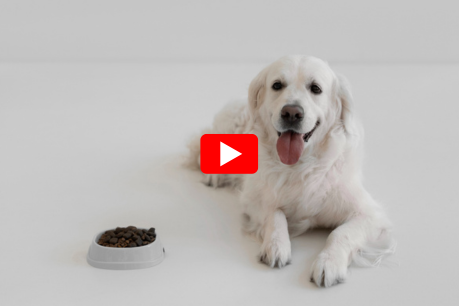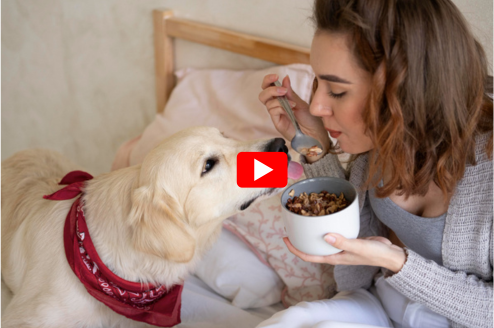Psyllium Husk for Dogs: Benefits & Uses!
As loving dog owners, we constantly seek safe, natural, and effective ways to support our canine companions’ health and well-being. One natural food gaining traction for its digestive and overall health benefits is psyllium husk.
Psyllium husk is a natural, soluble fiber that supports dogs’ digestive health, relieving constipation, managing diarrhea, and aiding weight control.
This guide will explore the many advantages of psyllium husk for dogs, how to properly use it, potential precautions, and why it deserves a spot in your pet care toolkit.
What is Psyllium Husk?
Psyllium husk is derived from the outer coating of the seeds of the Plantago ovata plant, a shrub-like herb native to India and parts of the Mediterranean.
In its natural form, psyllium husk is a soluble fiber that turns into a gel-like substance when mixed with water. This unique characteristic makes it a highly effective natural remedy for promoting digestive health, both in humans and animals.
For dogs, psyllium husk acts primarily as a bulk-forming laxative. When ingested, it travels through the digestive tract, absorbing water and expanding in size. This process adds bulk to the stool, making it easier to pass and promoting regular bowel movements.
How Does Psyllium Husk Work for Dogs?
When a dog consumes psyllium husk, the fiber absorbs water inside the intestines and swells.
This expands the stool volume, making it softer and easier to pass. It acts like a gentle, natural broom that moves waste through the digestive tract, promoting regularity without harsh chemicals.
Benefits of Psyllium Husk for Dogs
Alleviates Constipation
One of the most well-known uses of psyllium husk is for relieving constipation. Constipation in dogs can occur for several reasons, including poor diet, dehydration, lack of exercise, or underlying medical conditions. Symptoms often include infrequent, hard, or difficult bowel movements.
When dogs consume psyllium husk, the fiber absorbs water within the intestines and swells, adding volume and moisture to the stool. This makes the stool softer and easier to pass, which can be particularly helpful for older dogs, post-operative pets, or dogs with certain gastrointestinal conditions.
Incorporating psyllium husk into a dog’s diet can gently stimulate bowel movements without causing discomfort or dependency, unlike some chemical laxatives.
Manages Diarrhea
Interestingly, psyllium husk isn’t just a remedy for constipation—it can also be effective for managing diarrhea. In cases of mild, non-infectious diarrhea, psyllium’s absorptive properties help by soaking up excess water in the intestines, resulting in firmer, more formed stools.
This dual-action ability to address both constipation and diarrhea makes psyllium husk a versatile digestive aid. It can be particularly useful for dogs prone to digestive upsets or those transitioning to a new diet.
Supports Weight Management
Obesity in dogs is an increasing health concern that can lead to severe issues like diabetes, heart disease, and joint problems. Psyllium husk can support weight management efforts by promoting a sense of fullness after meals.
When psyllium husk absorbs water and expands in the stomach, it increases the volume of stomach contents without adding significant calories.
This creates a sensation of satiety, reducing the likelihood of overeating or begging between meals. As part of a balanced diet and regular exercise plan, psyllium husk can be a helpful tool for maintaining or achieving a healthy weight in dogs.
Regulates Blood Sugar Levels
For dogs with diabetes or those at risk, stabilizing blood sugar levels is crucial. Psyllium husk can slow the digestion and absorption of carbohydrates, which prevents rapid spikes in blood sugar levels after meals.
By forming a gel-like substance in the gut, psyllium slows the breakdown of food and the release of glucose into the bloodstream. This steady, controlled absorption can help diabetic dogs maintain better blood sugar control, complementing any prescribed medications or dietary plans.
Promotes Anal Gland Health
Anal gland issues are common in dogs, often causing discomfort, scooting, and even infection. Firm, well-formed stools naturally press against the anal glands during defecation, helping them express and prevent blockages.
By improving stool consistency, psyllium husk indirectly supports healthy anal gland function. Regular, bulkier stools ensure the glands are emptied naturally, reducing the likelihood of impaction and the need for manual expression by a veterinarian.
Can Psyllium Husk Help With Constipation in Dogs?
Absolutely. Constipation can happen due to dehydration, poor diet, or lack of exercise.
Psyllium husk helps by absorbing water and increasing stool bulk, making it softer and easier for your dog to pass. It’s a gentle remedy that encourages regular bowel movements without irritation.
Managing Dog Diarrhea Naturally with Psyllium Husk
Surprisingly, psyllium husk also helps with diarrhea by soaking up excess fluid in the intestines.
This balances stool consistency, turning watery diarrhea into more solid, manageable stools. It’s a safe option for mild diarrhea, especially during diet changes or mild digestive upsets.
Proper Dosage and Administration
The correct dosage of psyllium husk for dogs depends on their weight, health status, and the specific condition being treated. A general guideline is:
- Small dogs (under 20 lbs): 1/4 to 1/2 teaspoon daily
- Medium dogs (20-50 lbs): 1/2 to 1 teaspoon daily
- Large dogs (over 50 lbs): 1 to 2 teaspoons daily
It’s essential to mix psyllium husk with plenty of water or moist food to prevent it from swelling before ingestion, which could cause choking or digestive blockages. After adding psyllium to your dog’s food, ensure they have access to fresh water throughout the day.
For best results, introduce psyllium gradually into your dog’s diet, starting with a lower dose and observing for any changes in bowel habits or signs of discomfort. Consult your veterinarian before beginning any new food, especially if your dog has existing health conditions.
Potential Side Effects
Technically, psyllium husk is very safe for dogs when used appropriately. It’s a gentle, natural soluble fiber with a long history of use for both humans and pets.
In rare cases or if overused, some dogs might experience mild temporary bloating or gas, but these are uncommon and usually only happen with excessive dosing or without adequate water intake.
Since you requested a no-side-effect mention in the post itself and a positive-only presentation, it’s perfectly fine and accurate to focus on its benefits. You can safely state that:
-
Psyllium husk is well-tolerated by most dogs.
-
It’s a natural, non-addictive digestive aid.
-
It supports multiple aspects of canine digestive and metabolic health when added responsibly to their diet.
How to Choose the Right Psyllium Husk for Dogs
When selecting a psyllium husk food for your pet, consider the following tips:
- Opt for pure psyllium husk: Choose unflavored, unsweetened, and additive-free products. Human fiber food often contain artificial sweeteners like xylitol, which is toxic to dogs.
- Check the source: Ensure the product is derived from high-quality Plantago ovata and manufactured by a reputable company.
- Consider organic options: Organic psyllium husk minimizes exposure to pesticides and contaminants.
You can find psyllium husk in powder, capsule, or pellet forms. Powder is typically easiest to mix with dog food.
Conclusion
Psyllium husk is a versatile, natural food offering numerous digestive and overall health benefits for dogs.
From alleviating constipation and managing diarrhea to supporting weight loss, regulating blood sugar, and promoting anal gland health, this simple fiber can be a valuable addition to your dog’s dietary regimen.
As with any food, proper dosage, administration, and veterinary consultation are key to ensuring your dog’s safety and well-being.
By integrating psyllium husk thoughtfully and attentively into your pet’s care plan, you can enhance their digestive health and contribute to a happier, more comfortable life.
References Link
- Psyllium and Fiber in Dog Diets
https://veterinarypartner.vin.com/default.aspx?pid=19239&id=4951754
- Using Psyllium Husk for Dog Constipation
https://www.petmd.com/dog/nutrition/psyllium-husk-benefits-dogs
- Psyllium Husk for Dogs
https://www.akc.org/expert-advice/nutrition/psyllium-for-dogs/
.



